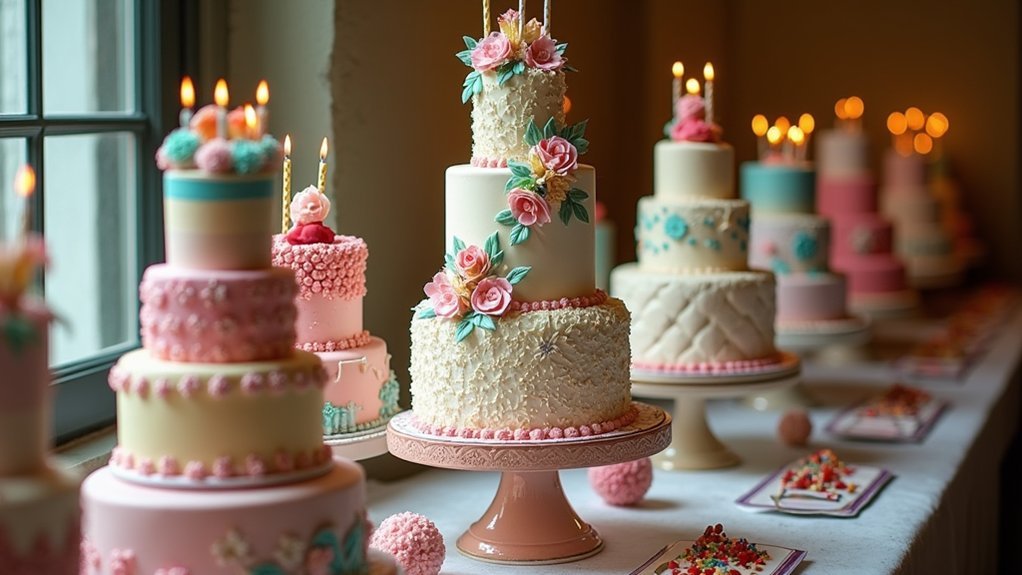The History of Celebration Cakes in the UK
The history of celebration cakes in the UK combines ancient customs with modern baking techniques. Cakes initially started as basic grain mixtures and were used in communal festivities in ancient Egypt and Greece. By the Middle Ages, they transformed into intricate creations associated with social status. Birthday and wedding cakes became significant, marking personal achievements. Today, with a focus on sustainability and advances in baking technology, the evolution of celebration cakes remains popular among food lovers and at community events.
Key Takeaways
Celebration cakes have a rich history in the UK, starting from ancient rituals where simple grain-based foods were used in Neolithic times, to the intricate cakes we enjoy today.
In medieval times, cakes were a symbol of wealth and community. Traditions like the Twelfth Night cake brought people together during festivities, strengthening social bonds.
The modern birthday cake tradition has roots in ancient Egypt and Greece, where candles were lit to signify prayers and celebrate individual milestones.
Wedding cakes in the UK have transitioned from basic bread-breaking rituals to the impressive tiered cakes we see now, reflecting social status and grandeur, particularly during the 19th century.
Today’s celebration cakes feature bold flavours and innovative designs, combining nostalgia with contemporary tastes and baking techniques.
Ancient Origins of Celebration Cakes
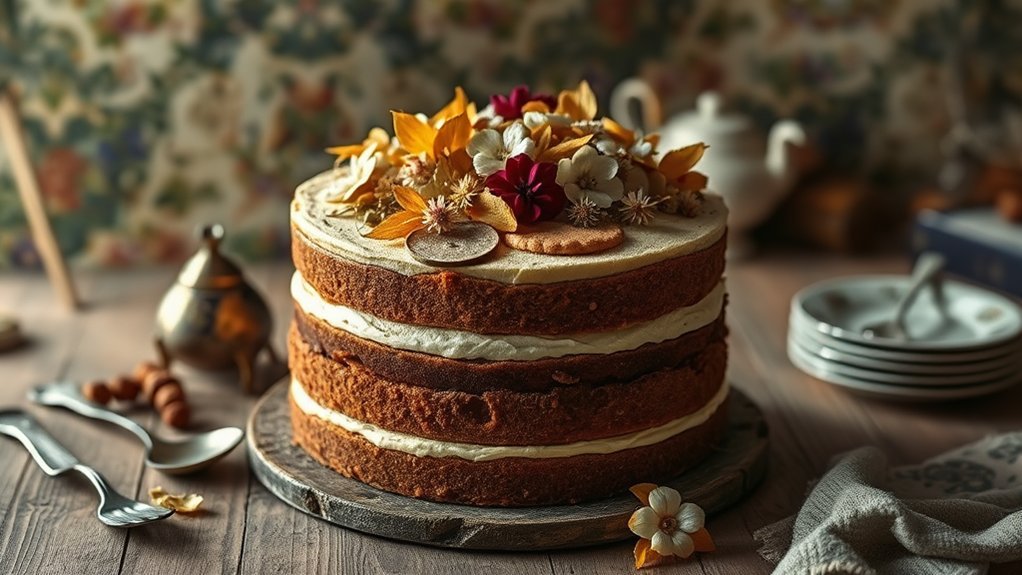
The origins of celebration cakes date back thousands of years, with early versions made from crushed grains appearing during Neolithic times.
In ancient civilisations like Egypt and Greece, cakes played key roles in festivities and were often offered to gods. Egyptians would celebrate the birthdays of pharaohs with elaborate feasts, while the Greeks baked round cakes with honey and nuts to honour Artemis, representing the moon. The Romans continued this tradition, using cakes as offerings to both gods and emperors.
Although these early cakes were simple, they held cultural significance, highlighting how communal celebrations and reverence were intertwined with baking, ultimately influencing the modern celebration cake we enjoy today. These early cakes laid the groundwork for what would evolve into the “sweetened flour-based products” that became popular in Medieval England.
The Influence of the Middle Ages
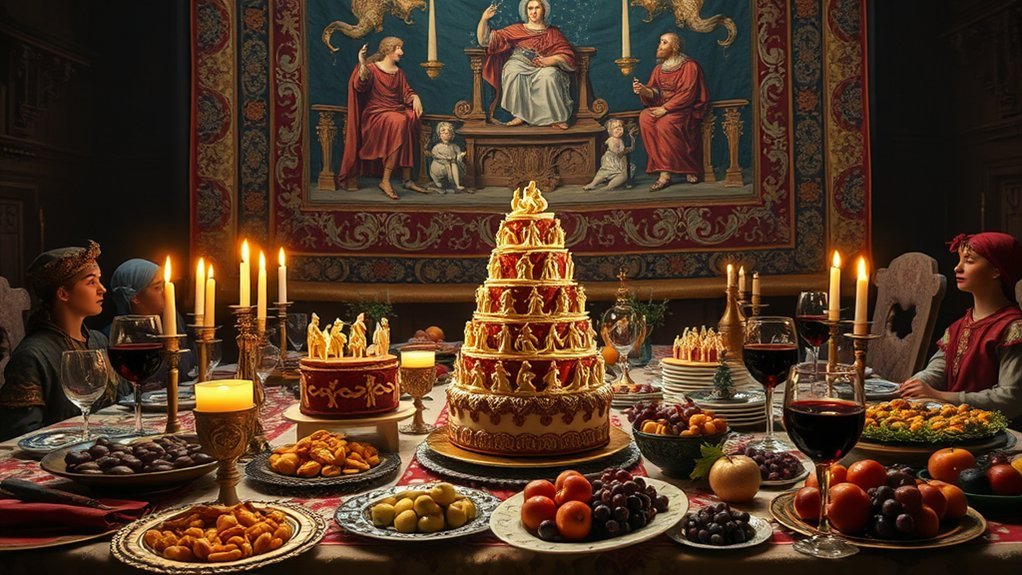
The evolution of celebration cakes took a notable turn during the Middle Ages, characterised by diverse culinary practices and lively customs. Cakes became essential to medieval festivities, carrying rich symbolism.
Here are four key influences:
- Fruit Cakes and Spiced Breads: These were commonly enjoyed and often linked to celebrations.
- Twelfth Night Cake: This cake, loaded with fruit, contained a hidden bean or pea, which determined who’d be ‘king’ or ‘queen’ for the day. The tradition of the Twelfth Night cake dates back to the Roman era when it was associated with festive merriment.
- Soul Cakes: Given to the poor on All Souls’ Day, these sweet breads helped strengthen community ties.
- Elaborate Designs: Cakes from the upper classes symbolised wealth and status, setting trends for future celebrations.
The Impact of Sugar on Cake Development
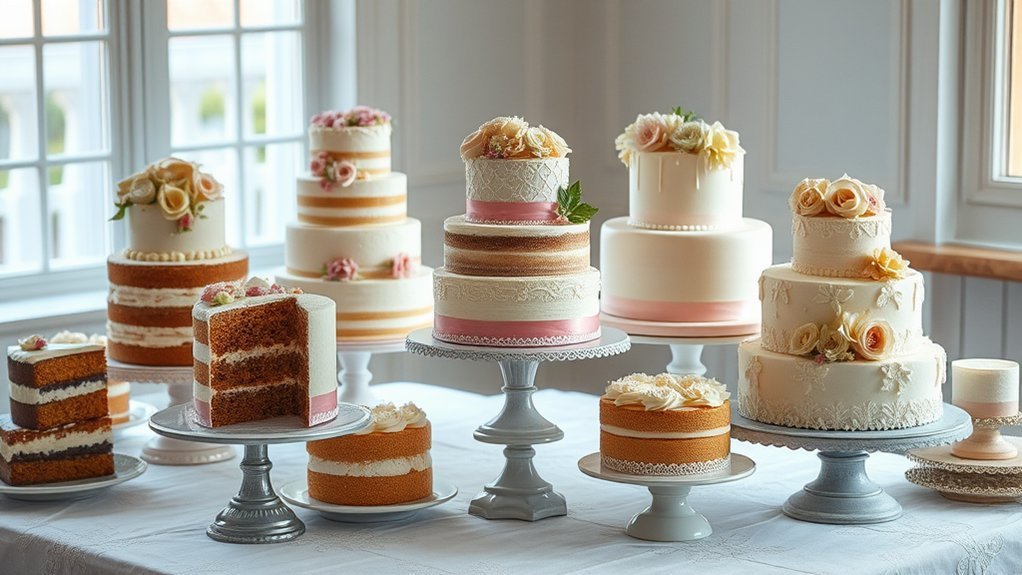
The role of sugar in cake development is often overlooked, but its effects on texture, flavour, and overall appeal are significant. The history of sugar in the UK shows a marked evolution, from colonial availability to modern-day restrictions. Despite efforts to cut down on sugar, consumers still prioritise taste alongside health. Sugar reduction in new product development has become increasingly important due to HFSS regulations.
| Aspect | Impact of Sugar |
|---|---|
| Texture | Adds fluffiness and improves mouthfeel |
| Shelf Life | Keeps cakes fresher for longer |
| Sweetness | Essential for the flavour profile |
Today’s cake recipes struggle to maintain these qualities while following health guidelines. When baking or enjoying cakes, consider how sugar affects both pleasure and well-being, ultimately enhancing the experience of celebration.
Birth of the Birthday Cake Tradition
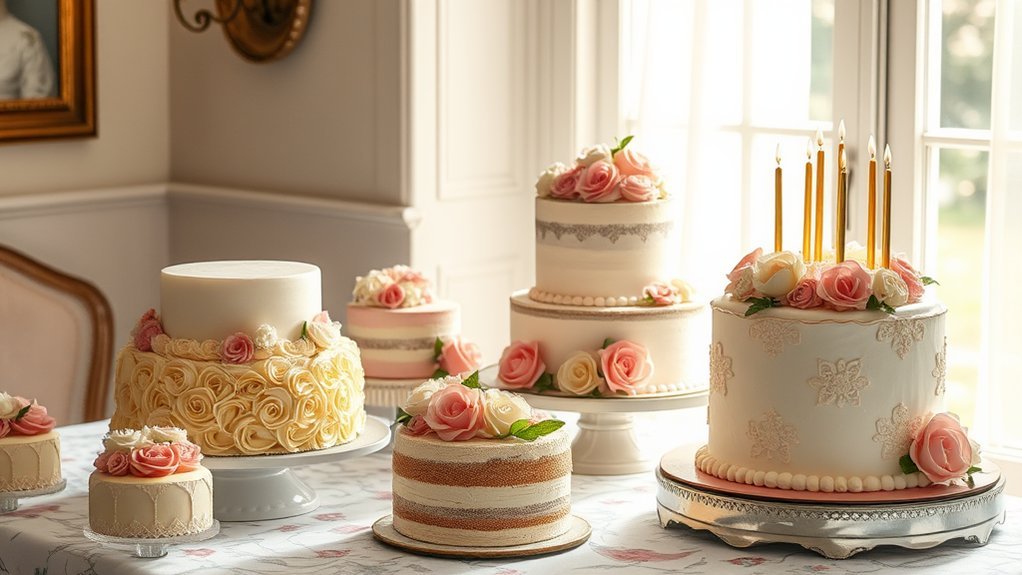
The tradition of celebration cakes dates back to ancient civilisations, each contributing to the birthday cake customs we know today. The origins of the birthday cake tradition include:
- Ancient Egyptians: Celebratory foods symbolised rebirth during the coronation of pharaohs.
- Greek Influence: Honey cakes were offered to Artemis, with candles representing the moon’s glow.
- Roman Celebrations: Upper-class birthday celebrations featured circular honey cakes.
- Candle Symbolism: Candles were seen as prayers ascending to the heavens, adding depth to the cake’s meaning.
These early celebrations not only honoured individuals but also sought divine protection, setting the stage for today’s birthday festivities that bring communities together in shared joy.
Evolution of Wedding Cakes in the UK
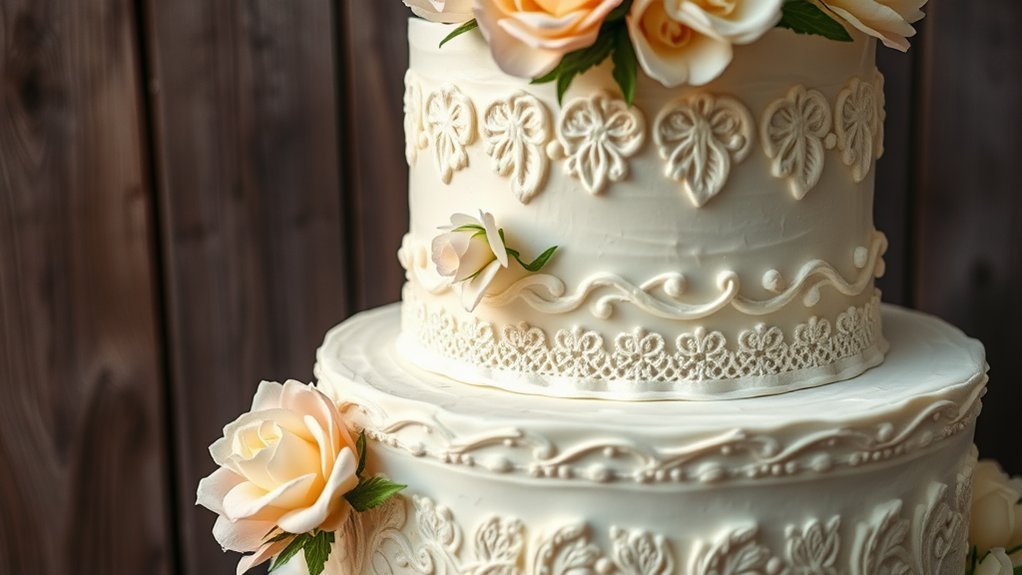
As wedding customs have changed over the years, the wedding cake has become a key symbol of celebration and prosperity in the UK. Its design and flavours often reflect social status and cultural shifts. In earlier times, fruitcake was popular, symbolising good fortune, while royal influences set the bar for grandeur.
| Era | Key Features |
|---|---|
| Ancient Rome | Breaking bread for good luck |
| Medieval England | Stacked cakes representing prosperity |
| 19th Century | Tiered cakes as a sign of wealth |
| Victorian Era | White icing to signify purity |
| Modern Trends | Variety of flavours and personalisation |
The shift from rich fruitcake to lighter sponge cakes highlights how wedding cakes convey individuality and cultural heritage, making each celebration unique.
Innovative Trends in Modern Celebration Cakes
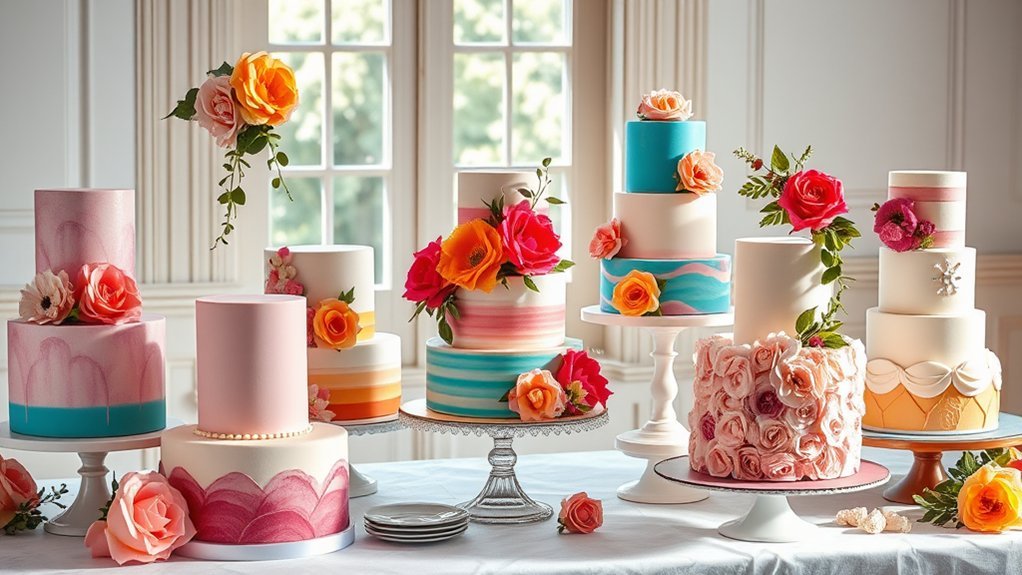
Celebration cakes have evolved into stunning edible art, featuring intricate designs that tell personal stories and reflect themes. Customisation is now an expectation, allowing for a unique cake in every celebration. Moreover, the rise of sustainable baking practices shows a commitment to environmental responsibility, appealing to an increasing number of people who want beauty and conscience in their cake choices. Additionally, the use of organic ingredients in celebration cakes enhances both nutrition and flavor, aligning with the health-conscious preferences of modern consumers.
Edible Art Creations
Cakes have evolved from simple desserts to captivating centrepieces for any occasion, thanks to the rise of edible art.
Today’s cake designs feature intricate edible sculptures that take celebrations to the next level. Here are some exciting trends to consider:
- Candle Cakes: These mimic melting wax, creating stunning visuals.
- Oversized Cakes: Bold shapes, like table-length rectangles, leave guests in awe.
- Rainbow and Piñata Cakes: Bright interiors offer delightful surprises.
- Brush Stroke Cakes: Textured chocolate patterns add an artistic touch.
Innovative flavours like pistachio and indulgent chocolate enhance the experience, ensuring your cakes are as delicious as they’re beautiful, truly capturing the spirit of modern celebration cakes.
Customization and Personalization
Customisation and personalisation in celebration cakes have turned them into unique reflections of individual stories and preferences, enhancing the celebratory experience.
You can personalise your cake by incorporating favourite hobbies or inside jokes, making each one truly memorable. Consider using colour themes, such as vibrant drip effects, to match your event’s aesthetic, or adding personal photographs for extra meaning.
Catering to flavour preferences ensures that everyone can enjoy a slice, accommodating dietary needs. Additionally, interactive elements like colour-in fondant can engage guests in a fun way. Furthermore, using organic ingredients can elevate the quality and health benefits of your cake, ensuring a delightful experience for all.
With design inspirations ranging from retro styles to floral elegance, your cake becomes a centrepiece that delights the taste buds and embodies the essence of the occasion.
Sustainable Baking Practices
As celebration cakes evolve to tell personal stories, many bakers are also adopting sustainable baking practices that reflect a commitment to environmental responsibility.
By using eco-friendly methods, you can help create a healthier planet. Here are some key sustainable practices:
- Choose sustainably sourced ingredients to support local farmers and reduce your carbon footprint.
- Use biodegradable and compostable packaging to cut down on plastic waste.
- Implement waste reduction strategies, such as donating leftover cakes to local charities.
- Incorporate energy-efficient baking techniques to reduce electricity usage.
Additionally, prioritizing local sourcing of ingredients can significantly reduce transportation emissions and further lower your carbon footprint.
Cultural Significance of Cakes in Society
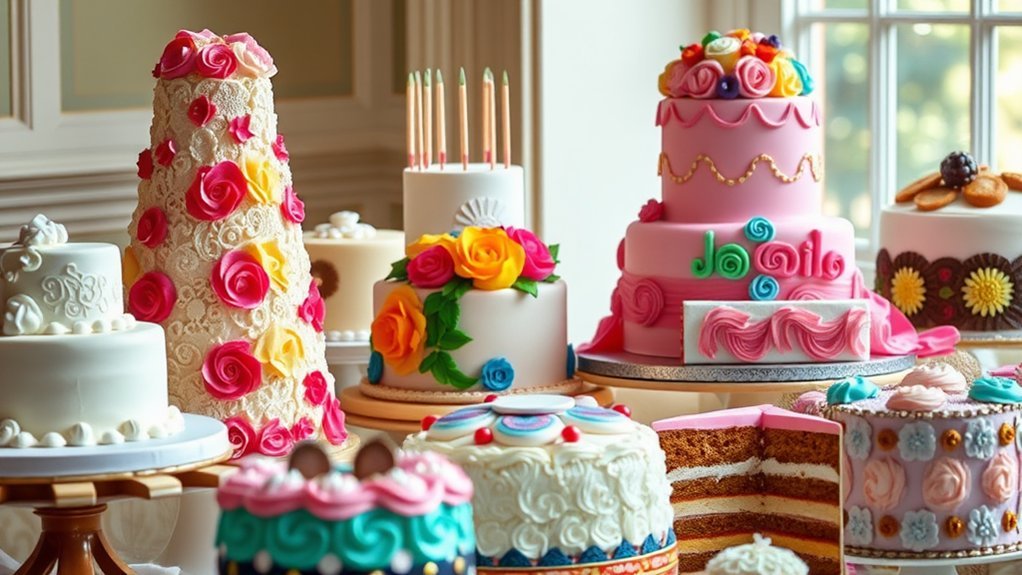
Cakes hold a significant place in our culture, going beyond simple treats to represent shared experiences and community connections. They’re central to important occasions like birthdays and weddings, symbolising life’s milestones and the emotional bonds we share with friends and family.
At social gatherings, cakes often take centre stage, bringing people together in celebration.
Historically, cakes have reflected societal changes, evolving from luxury items for the wealthy to beloved treats accessible to everyone. This shift highlights not only changing tastes but also the ongoing importance of cakes in our cultural heritage.
Their presence at key events emphasises their role in strengthening social ties and creating lasting memories, adding joy and tradition to our lives.
The Role of Technology in Cake Design
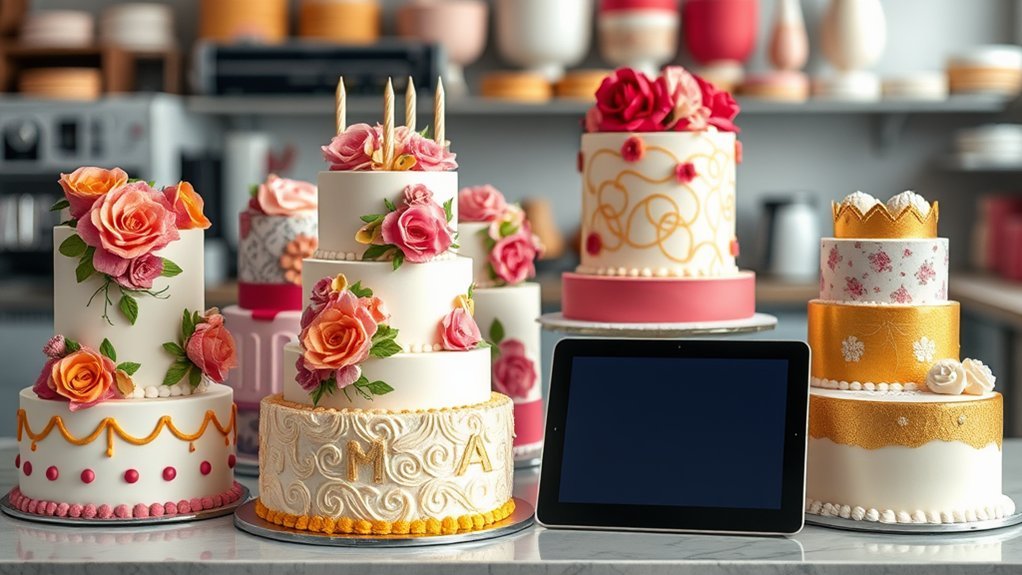
The artistry of cake design has evolved significantly with the introduction of technology, transforming how bakers craft and showcase their creations.
Here are some notable advancements:
- Augmented and Virtual Reality: Use virtual tools to preview cake designs before you start baking.
- AI-Driven Recipes: Generate consistent results that cater to specific dietary requirements.
- Smart Kitchen Appliances: Make baking more efficient with innovative gadgets that simplify processes.
- 3D Printing: Produce intricate shapes and custom decorations with precision.
These advancements not only enhance your baking efficiency but also allow for greater creativity and personalised designs, turning your cakes into true works of art that are sure to impress.
Sustainability in Cake Baking Practices
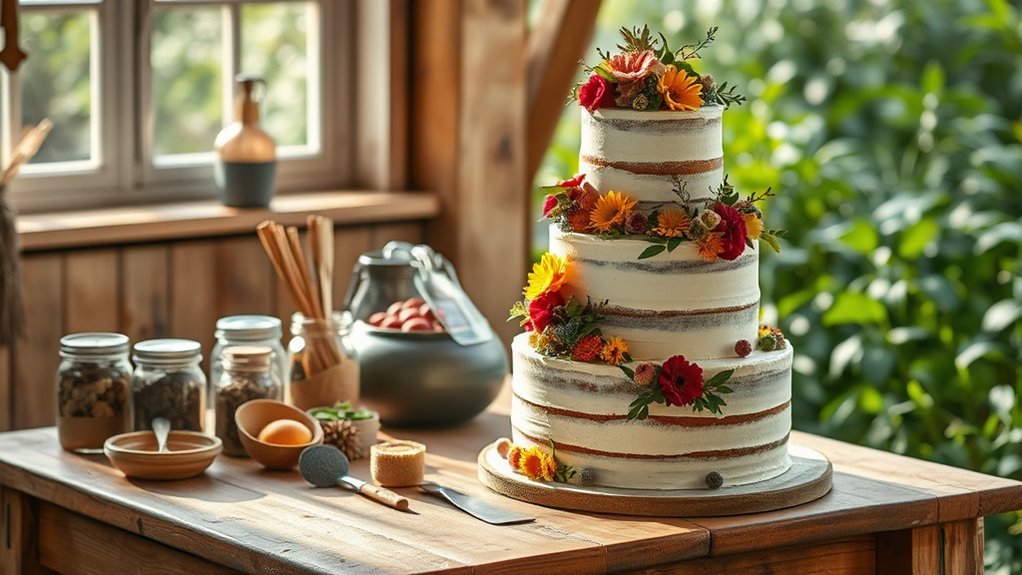
Sustainability in cake baking is becoming increasingly important as bakers recognise the environmental impact of their choices. By sourcing ingredients locally, you not only reduce carbon emissions but also support local businesses.
Using eco-friendly packaging helps cut down on waste, and donating leftover cakes promotes responsible consumption. The growing popularity of plant-based options also helps lower greenhouse gas emissions and caters to various dietary preferences.
Additionally, using energy-efficient appliances can further reduce your carbon footprint. As consumers become more aware, ethical sourcing is crucial, encouraging bakers to adopt these sustainable practices.
Collectively, these efforts pave the way for a more sustainable future in cake baking, benefiting everyone and the planet.
Future Directions for Celebration Cakes in the UK
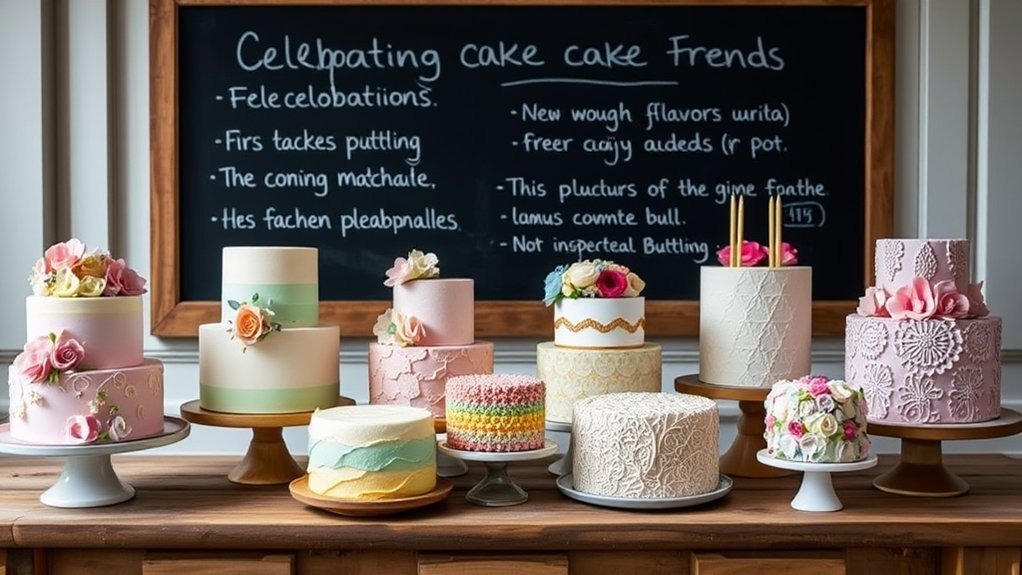
As celebration cakes in the UK continue to evolve, bakers are embracing new flavours and designs that reflect modern tastes.
Here are some anticipated trends shaping the market:
- Bold Flavours: Cakes featuring sour and spicy notes are becoming popular, adding excitement to traditional recipes.
- Global Inspirations: Unique flavours like miso caramel and pistachio are on the rise, showcasing a blend of diverse culinary influences.
- Sweet-Heat Combinations: Cakes that incorporate chilli-infused chocolate and similar pairings are gaining popularity.
- Tech-Enhanced Creativity: Innovative tools are enabling bakers to create unique shapes and textures, pushing the boundaries of cake design.
As you explore these trends, remember that the balance between nostalgia and innovation will continue to shape the future of celebration cakes, keeping them a beloved staple at social gatherings.
Frequently Asked Questions
What Are the Most Popular Flavors for Celebration Cakes Today?
Currently, vanilla sponge and chocolate ganache are the leading flavours for celebration cakes in the UK. These timeless options come in a variety of designs, providing a pleasing combination that guests love. Their popularity ensures that any celebration feels both elegant and memorable.
How Do Cultural Traditions Influence Cake Designs in Different Regions?
Did you know that 70% of people prefer cakes that reflect local traditions? Regional styles often include festive symbols, ensuring your cake connects with cultural roots. This makes gatherings more special and memorable, honouring various customs and personal stories. For example, a traditional British wedding cake typically features tiers and marzipan, while a Scottish celebration might showcase a fruitcake adorned with thistles. Embracing these regional designs can truly enhance the occasion.
What Are Common Cake-Related Superstitions Around the World?
Cake superstitions vary significantly around the globe. For example, certain frosting colours are believed to represent luck or love in various cultures. Knowing these traditions can add depth to your celebrations, making each cake more meaningful and culturally significant.
How Do Dietary Restrictions Affect Cake Recipes and Choices?
When baking for friends, it’s important to consider their dietary needs. Using gluten-free alternatives and vegan frosting can easily adapt traditional recipes. These changes result in delicious cakes that cater to everyone’s preferences, ensuring every celebration is inclusive and enjoyable.
What Role Do Cake Competitions Play in the Baking Community?
Cake competitions play a vital role in the baking community by bringing people together and highlighting various baking techniques. They encourage bakers to collaborate and share their creativity, while also inspiring others to pursue their baking interests. Events like local bake-offs or charity cake sales not only showcase talent but also celebrate shared traditions and foster connections among enthusiasts.
Conclusion
Celebration cakes in the UK have come a long way, evolving from ancient customs to contemporary creations. These cakes are more than just desserts; they represent joy, love, and community spirit. With advancements in technology influencing designs and a growing emphasis on sustainability, the future of these cakes looks promising. By blending tradition with modern techniques, celebration cakes continue to tell our stories—one slice at a time.

